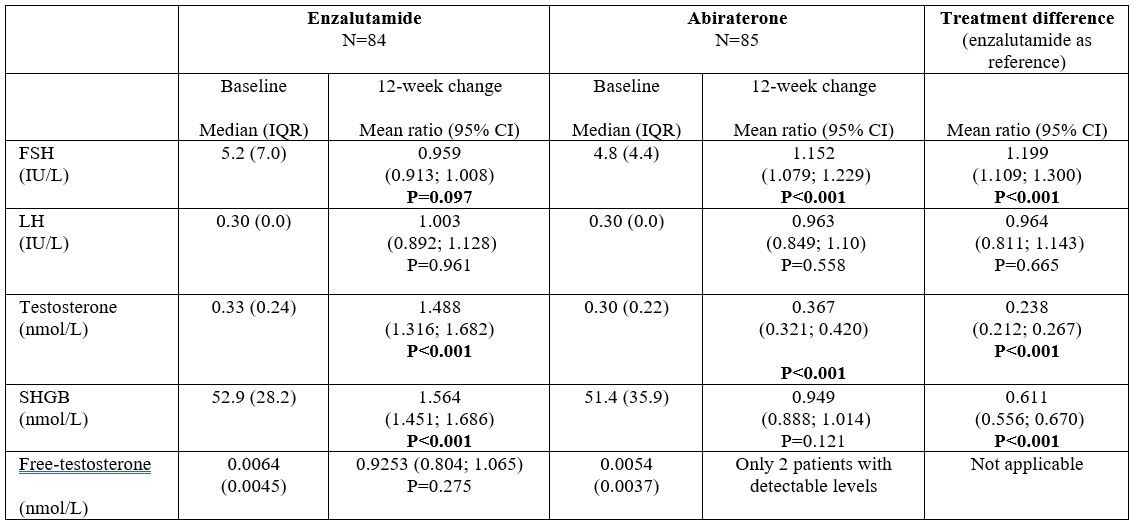Back
Poster, Podium & Video Sessions
Moderated Poster
MP48: Prostate Cancer: Advanced (including Drug Therapy) III
MP48-05: Changes in pituitary–gonadal hormones after enzalutamide or abiraterone plus prednisone in men with castration-resistant prostate cancer (HEAT): results from a randomised clinical trial
Sunday, May 15, 2022
2:45 PM – 4:00 PM
Location: Room 225
Klara Ternov*, Jens Sønksen, Mikkel Fode, Henriette Lindberg, Herlev, Denmark, Caroline Kistorp, copenhagen, Denmark, Rasmus Bisbjerg, Jens Faber, Herlev, Denmark, Ganesh Palapattu, Ann Arbor, MI, Peter Busch Østergren, Herlev, Denmark
- KK
Poster Presenter(s)
Introduction: Enzalutamide (ENZ) and abiraterone acetate plus prednisone (AAP) are both androgen receptor targeting treatments for metastatic castration-resistant prostate cancer (mCRPC). AAP inhibits the androgen production, whereas ENZ blocks the androgen receptor signalling. Herein, we compare treatment changes between ENZ and AAP in hormones of the pituitary–gonadal axis.
Methods: First-line ENZ (160mg/day) and AAP (1000mg abiraterone acetate and 10mg prednisone/day) for mCRPC were compared in this randomised (1:1) phase IV trial. Eligible patients had progressive metastatic prostate cancer castrate levels of testosterone ( <1.7nmol/L). Fasting serum hormones, including testosterone, free-testosterone, sexual hormone binding globulin (SHGB), follicle-stimulating hormone (FSH) and luteinizing hormone (LH), were measured by the gold standard assay liquid chromatography – tandem mass spectrometry before 11 am at baseline and at 12-week post-intervention. The treatment difference in changed hormones was compared with logarithmic mixed models analysis, and the within-subject change for each treatment group was analysed with logarithmic paired samples t-test.
Results: From June 2017 to September 2019, 170 participants were randomized to receive ENZ (n=84 analysed) or AAP (n=85 analysed). A 19.9% higher increase in FSH was found for ENZ than AAP. A larger decline in testosterone and SHGB was found for AAP than ENZ. More patients had lower than detectable levels of free-testosterone in the AAP group (83/85) than the ENZ group (6/84) (chi-square test p<0.001).
Conclusions: In men with castrate-levels of testosterone, ENZ and AAP both inhibit the androgen stimulation of prostate cancer, but by different mechanism of action resulting in different pituitary–gonadal hormonal profiles.
Source of Funding: Herlev and Gentofte University Hospital

Methods: First-line ENZ (160mg/day) and AAP (1000mg abiraterone acetate and 10mg prednisone/day) for mCRPC were compared in this randomised (1:1) phase IV trial. Eligible patients had progressive metastatic prostate cancer castrate levels of testosterone ( <1.7nmol/L). Fasting serum hormones, including testosterone, free-testosterone, sexual hormone binding globulin (SHGB), follicle-stimulating hormone (FSH) and luteinizing hormone (LH), were measured by the gold standard assay liquid chromatography – tandem mass spectrometry before 11 am at baseline and at 12-week post-intervention. The treatment difference in changed hormones was compared with logarithmic mixed models analysis, and the within-subject change for each treatment group was analysed with logarithmic paired samples t-test.
Results: From June 2017 to September 2019, 170 participants were randomized to receive ENZ (n=84 analysed) or AAP (n=85 analysed). A 19.9% higher increase in FSH was found for ENZ than AAP. A larger decline in testosterone and SHGB was found for AAP than ENZ. More patients had lower than detectable levels of free-testosterone in the AAP group (83/85) than the ENZ group (6/84) (chi-square test p<0.001).
Conclusions: In men with castrate-levels of testosterone, ENZ and AAP both inhibit the androgen stimulation of prostate cancer, but by different mechanism of action resulting in different pituitary–gonadal hormonal profiles.
Source of Funding: Herlev and Gentofte University Hospital

.jpg)
.jpg)